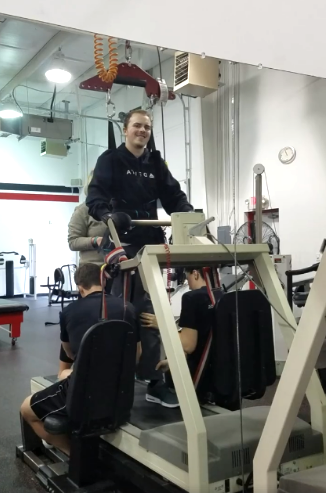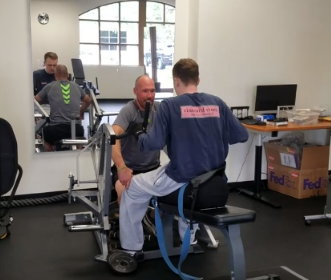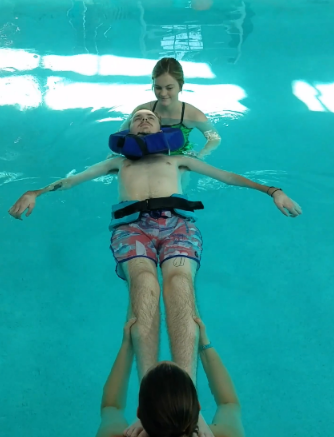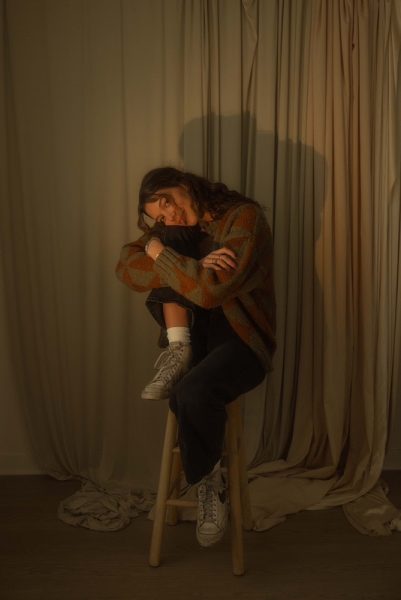#TheFight4Ry: UNCW student returns to campus after sustaining life-changing injury

Courtesy of Ryley Hopper
Hopper was given the opportunity to go to California and take part in physical therapy that allowed him to walk on his own with assistance.
Ryley Hopper, a UNC Wilmington sophomore, had a relaxed afternoon ahead of him on July 17, 2016. Before he had work later in the day, he and some friends planned to go to a private pool in Raleigh’s Saddleridge neighborhood. It was ironic, Hopper recalled, that his friend, who was a lifeguard and manager of said pool, had never had to save someone before that day.
This year would have been Hopper’s junior year had it not been for that accident a little over a year ago. On that day, Hopper dove into the neighborhood pool, fractured his C6 vertebrae in his neck, split his head open and drowned. Hopper’s friends pulled him out of the water after one to two minutes; they thought he had been kidding around. When he was pulled from the water, they realized that he was not responsive and performed CPR on him until the fire department arrived.
When he dove into the pool, Hopper sustained a burst fracture to his C6 vertebrae, the sixth vertebrae from the top of the spine. According to the Johns Hopkins Health Library, “generally, the higher up the level of injury to the spinal cord, the more severe the symptoms.” Cedar-Sinai says that burst fractures are typically more severe in nature than compression fractures, as in burst fractures, “the bones spread out in all directions and may damage the spinal cord.” Taken all together, this meant that Hopper’s injury would have some serious implications for his health moving forward.
“I got taken straight to Duke…I was in a coma for six days, was in the Intensive Care Unit [ICU] for 25 days, had a pulmonary embolism, and the medicine keeping me in my coma I was allergic to,” Hopper said, “so I had lung failure from that and then I had pneumonia from drowning. I died on like three separate occasions.”
The ICU was not bad, according to Hopper. He was at Duke, a top-notch medical facility, and there were “super sweet” people there. “The people that were taking care of me were like super attractive, and I was all drugged up. So, I had really no clue what was going on,” Hopper said.
Hopper does not remember a time any one came in, sat down with him and explained what was going on. He was also unable to speak for a period of time, relying on glasses with lasers to point at letters to spell out words so people knew what he had to say.
“That was so frustrating,” Hopper recalled about the glasses. “[However], I was able to go outside once at Duke–they had to harness me into a chair–and that was really nice.”
After his stay at Duke Hospital, Hopper was sent to the Shepherd Center, a spinal cord and brain injury rehabilitation center in Atlanta, for 11 weeks. He said that he started off there pretty slow. Mobility wise, Hopper was in a large electric chair that he had to control with a straw. In order to make progress and regain mobility, he just kept pushing forward and he eventually went home for the holidays.
Hopper went back to Shepherd for a second stay, and his goal this time was to get into a manual chair. Still focused on standing, Hopper went through a lot of physical therapy. Progress in recovery is coming and will continue to come with therapy, Hopper said.
His father owns a company in medical devices and has been adamant about giving Hopper a lot of opportunities to recover. “I went to California for a month to do a clinical trial, which used epidural stimulation. They stick two electric pads [to you] and then hook it up to a machine and it sends signals before and then after injury. I was then voluntarily able to move my legs; it was really cool stuff.”
“When people are like ‘what kind of physical therapy are you doing,’ they’ll see videos of what I was doing and they will be blown away,” Hopper said. “Like I have adaptable cuffs, I can go in the gym and workout for two to three hours. In California, [I had] a lot of standing practice. With the machine I was able to stand on my own. Like freestanding stuff. Kind of normal stuff I am getting into now that I could not do in the beginning.”

Hopper hopes to get back into the gym, since his work with physical therapy has been helping him regain some mobility.
Videos documenting Hopper’s recovery can be found on Duke Health’s YouTube account as well as on Hopper’s recovery Facebook page: Ryley Hopper’s Spinal Cord Injury Recovery #TheFight4Ry. Some of the videos range from water physical therapy to workout regimens that he worked on at Strides Sci Functional Fitness, the facility in California where Hopper and others with spinal cord injury or paralysis are given “the means to increase their ability to perform activities of daily living.”
Now, Hopper said that he is plateauing in his recovery process. He is currently working on triceps, which are weak for him. His wrist flexors are a bit weak as well; moving them upwards continues to pose a challenge. This difficulty is common in C6 fractures.
Before the accident, Hopper was 215 pounds; now, he weighs 160. “I lost 70 pounds in the hospital, in like a month. [I want to] try and gain some of that back.” Hopper has not been to the UNC Wilmington Recreational Center since he has been back–he has been very busy with Rush, since he is a brother in the fraternity Kappa Sigma–but the plan is to get back to working out.

Hopper is continuing to recover through physical therapy, and he hopes to keep making progress with his mobility.
Transitioning back socially has been easy, Hopper said. “Rush was awesome.” Hopper could not imagine being back without his brothers.
“Spending a year at home, it was the longest year of my life,” Hopper said. “It was like, everyday you wait for the next day and the next day comes but it’s the same thing. And that was how it was for an entire year, even when I went to California. The first two or three days were awesome and then that kind of set in again. Day by day, day by day. But now that I am back, I am no longer counting days like that anymore. I am just really enjoying myself.”
Classes are not bad for him, either; he gets a little extra time on quizzes and sometimes he does not even need it.
“My teachers are very understanding,” Hopper said. “I know a lot of kids in the classes I am taking so if I can’t take my own notes, I can have someone help with that. I have one online class where I am submitting at 10:59 p.m. [just before it is due]. Working around a computer, it takes a little while. I just have to dedicate more time to it. School sucks, except I love my economics class.”
Hobbies have changed since his accident, but coming back to a great support system was great, according to Hopper. For example, he got to go Masonboro Island at the beginning of this school year, and his brothers got him on and off of the boat. “Been up probably 2,000 stairs and I have been here for three weeks,” Hopper said. Hopper said his brothers plan these sorts of outings and events for him, taking into consideration his situation.
“I feel like this school does not have a large share of people in my situation but I think they are killing it,” Hopper said.
Hopper’s living situation is tailored to his specific circumstances. He lives in the Seahawk Landing, an on-campus apartment complex, and he said it is “awesome.” Everything is voice activated and he can do everything from his phone. It is a two-bedroom apartment, and currently his mother is living in the spare room until Hopper’s family can figure out nurse care through medicaid. Once that is completed, Mrs. Hopper will return home and her son will see if one of his pledge brothers can fill the second room.
“They are so cool here [at UNCW],” Hopper said. “I have one guy who emails me and he is like ‘I don’t like this fan for you’ and next day there is a new fan in. He brought a desk for me the other day.”
He has not needed to seek support systems outside of friends and family so far. He recalls how he has had “off days” but he accredits his friends or “homies” for helping him through these days. “They all know what is going on,” Hopper said. “They are always people I can talk to. Being back, like this is the first time in a while I have been able to enjoy myself. I am getting more independent. My mom dropped me off here [for this interview]. Soon I’ll be getting myself to class. And if I need any help, I have my friends.”
Hopper is currently taking economic and accounting classes in the hopes of getting into the Cameron Business School. He also made Dean’s List his freshman year while pledging Kappa Sigma. He is considering interning with his father’s company over summer 2018, since he will go home to Raleigh over the break.








